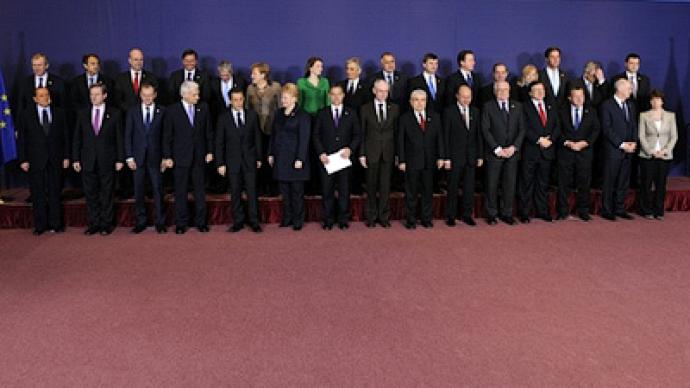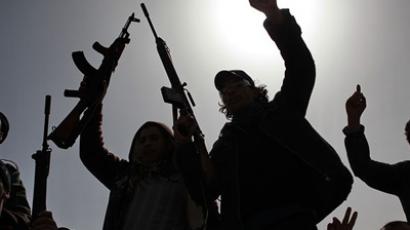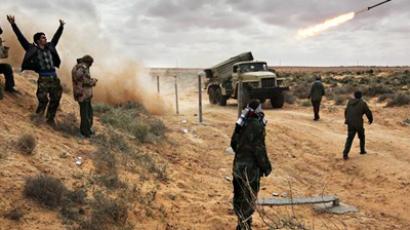European leaders call on Gaddafi to step down

Colonel Gaddafi must surrender power, the leaders of the EU’s 27 member countries have said in a unanimous declaration after an emergency summit in Brussels, and added they would examine “all necessary options” to protect Libya’s civilian population.
In a joint declaration, EU leaders said that the European Council “expresses its deep concern” about attacks against Libyan civilians, “including from the air”, and those responsible “will be held accountable and face grave consequences.”The declaration also says that “Gaddafi’s regime has lost all legitimacy and is no longer an interlocutor for the EU.”“The current leadership must give up power without delay," EU President Herman Van Rompuy told a press conference after the EU leaders’ talks.Herman Van Rompuy also said that the EU member states would “examine all necessary options, provided that there is a demonstrable need, a clear legal basis and support from the region.”The organization is waiting for the go-ahead from the UN Security Council before moving forward.However, the EU did not go as far as to call for a no-fly zone over Libya.In his turn, European Commission President Jose Manuel Barroso said this is no time for ambiguity.“Let me be clear. We have a regime turning against its own people when they are standing up for freedom,” he said after the summit. “The problem has a name: Gaddafi. He must go and this was the unanimous decision of the European Council supporting this approach.”“Time is running out. So we have to intensify our international pressure on the current regime to step down,” Jose Manuel Barroso added.Barroso also said that the EU will step up cooperation with international humanitarian organizations to alleviate the situation inside Libya and at its borders.“We have already freed up 37 million Euro and deployed teams on the ground,” Barroso said.Such an emergency summit of EU leaders has been held for the fourth time only. The previous ones were called in 2008 over the war in Georgia, over the Iraq war in 2003 and the attacks of 11 September 2001.European leaders have welcomed the interim transitional national council based in Benghazi and said they consider it a political interlocutor. Nevertheless, they did not follow France in officially recognizing the council’s authority.The EU leaders also called for the rapid holding of a summit between the Arab League, the African Union and the European Union.Meanwhile, there are growing concerns over the use of military force by NATO, which has announced it will keep its military options open.Nicolas Sarkozy urged conducting the aerial bombardment of Gaddafi-held parts of Libya.This follows France's official recognition of Libya's opposition and the invitation to two anti-Gaddafi rebel envoys to Paris.French President Sarkozy also compared Libya with Somalia, saying that it had no leadership anymore, and called on the EU members to follow France’s example and officially recognize Libya’s rebels as the legitimate rulers.Russia strongly opposes President Sarkozy’s proposal of an aerial bombardment. Russia’s deputy foreign minister says it is categorically against the unilateral use of force by anyone.The Czech president said that the establishment of a no-fly zone, strongly supported by the US and UK, means war against Libya and should not be regarded as a simple solution.Germany’s interior minister went further, saying there will be no military action by NATO for the time being.German Chancellor Angela Merkel said Germany no longer recognizes Gaddafi's regime as legitimate.Italy has become one of the most desirous of more diplomatic talks before any military action was taken, though it is suffering from the thousands of refugees fleeing Libya just across the coast of the Mediterranean.Italian President Giorgio Napolitano said his country will contribute to any action taken against Libya and back any decisions supported by the UN, EU or NATO. And this position is supported by most of the states, reports RT’s Daniel Bushell, who is following the summit in Brussels.Meanwhile, Italy’s largest bank, Unicredit, froze the assets of Libyan shareholders.Malta is refusing to back Libya’s government. And Britain is calling for Gaddafi to step down following previous reports that BBC’s journalists have been detained and beaten by members of Gaddafi’s regime.Arab League members are also seeking the backing, because the worst thing for them is for popular opinion to go against any foreign military intervention.NATO Secretary General Anders Fogh Rasmussen claimed their forces are on stand-by, speaking at a press briefing following the NATO meeting in Brussels.“It has been decided to increase the presence of NATO maritime assets in the Central Mediterranean. These ships will improve NATO’s situational awareness. So, our message today is, NATO is united, NATO is vigilant and NATO is ready to act,” Rasmussen said.
Konstantin Kosachev, head of the Russian State Duma Foreign Affairs Committee, told RT that only humanitarian intervention is acceptable.“For many countries this is a chance to influence the internal political development in Libya and these countries use this uncertain situation to support certain political forces,” says Kosachev. “An invasion, an intervention, may be needed, but only in [the] form of humanitarian intervention in order to rescue people from military attack by military forces coming from official Libya.”
Michael Ratner, president of the Center for Constitutional Rights, believes that should the US and its allies try to organize military intervention in Libya, it will be hypocritical in respect to other areas like Palestine or Cote d’Ivoire, where the US did not intervene just because there was no oil interest there. He also believes that NATO does not have credibility because of such attitude.“Why has the world been allowed to go down the drain in places like Gaza or Ivory Coast [sic], and yet no movement. And so their only credibility here is that they want to hold their oil, and that’s not very much credibility, and particularly after Iraq, that was essentially a war crime,” he said.
Dmitry Rogozin, Russia's Envoy to NATO, says there’s no unified position within the Alliance on possible military action against Libya: “NATO is doing everything possible to prepare for war, but it doesn’t have the slightest chance to achieve it,” said Rogozin.Rogozin says relevant committees should gather the information. as only the facts on the table of the UN Security Council can lead to any serious discussion on the matter.“So far, there have been no such facts. There have only been journalists’ reports from the conflict zone. On the whole, we consider the situation very complex, and it very much resembles a civil conflict,” Rogozin said. “There’s a real danger of military intervention in the affairs of a foreign state, in which Gaddafi, thanks to the West’s efforts, could easily become the most popular figure in the Islamic world, with an air of martyrdom around him. So skepticism against direct military intervention in Libya is growing stronger.”
The deputy-editor of Spiked magazine, Rob Lyons, thinks a possible intervention will be a real disaster for the Libyan people: “The recent historic experiences in Iraq and Afghanistan and a few other places show that much is done in the name of democracy and freedom, but actually the people involved are on the wrong end of the civilian deaths, they also have in many ways a lot less freedom than they had in the past”.
AdiI El. Shamoo, a senior analyst from the Institute for Policy Studies told RT about the best options of resolving the Libyan crisis, “I think they should leave all Arabs without military intervention at all because the Arabs want to own the entire revolution without any interference from the West”.














